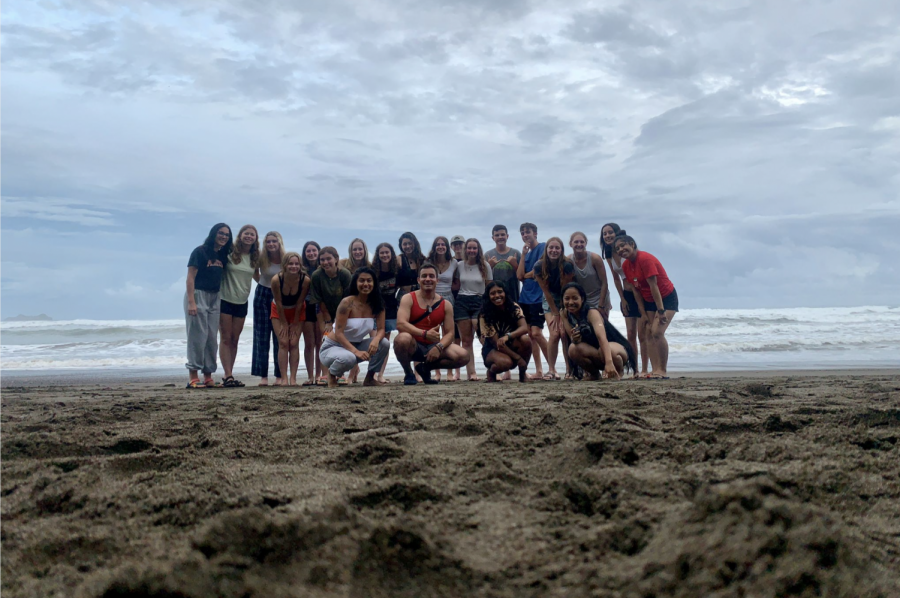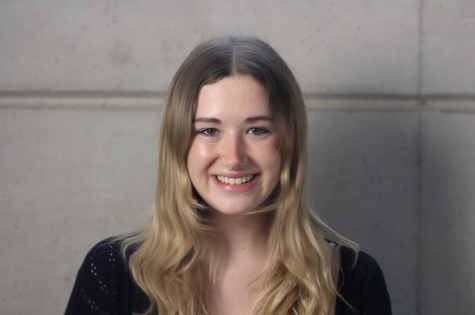Anyone who knows me will tell you I love to travel. Stepping foot in a novel area and immersing myself in the language, history and culture is an experience unmatched. So, when planning my summer this year, I couldn’t resist signing up for a service trip in Costa Rica after stumbling across it in a quick Google search.
The decision to participate in this trip came to fruition in a somewhat unconventional way. It was spurred by my desire to improve my Spanish speaking skills in preparation for the AP course coupled with a love for expanding my global perspective and giving back to others. The Global Works “Costa Rica: Children and Community” session fulfilled every one of those desires.
The trip began July 13, when 19 other students, our two trip leaders and I flew to the country’s capital, San José. Spanning two weeks, our group traveled across Costa Rica – winding our way through mountains, small towns (or as Costa Ricans would say, pueblos) and coastal areas – to volunteer at a rainforest biological station and a local elementary school.
Prior to the program, I had little knowledge of life in Costa Rica nor Central American life in general, for that matter. The Costa Rican “Pura Vida” culture was brand new to me and my knowledge of it still remains limited. Living a privileged life in London, I will never fully unravel their experience; I have only caught a small glimpse.
Shortly after arriving, we piled into a bus and began our long trek up to the mountain hotel which would become our home base for the remainder of the excursion. Not even 20 minutes from the airport, two characteristics of the country became blatantly apparent.
The first was the ubiquity of poverty. Outside my window, I gazed at shacks falling apart, rundown municipalities and young children working. The second was the brewing civil unrest of the country, pertaining particularly to governance. Walls of stores and supermarkets were emblazoned with messages reading “corrupt police” and “restore the economy,” among countless others.
These two negative aspects seemed remarkably out of place for such a gorgeous country. I found myself thinking, “How can a country so beautiful and culturally vibrant be ridden with instability?”
According to an article from “Geopolitical Intelligence Services,” a crumbling economy, plummeting employment rates and fragmented political parties have catalyzed civil dissatisfaction in Costa Rica. The country’s poverty rate marks over a quarter of the population, and the reflection of that number in the slice of life I glimpsed during that bus ride made one thing abundantly clear: my life differs so greatly from theirs.
Observing these difficulties firsthand evoked both a sense of motivation and poignancy. If I could, I would switch places with such strong young children living in extremely cramped quarters and working to provide for their families. Then, I could use my privilege for good. I wanted to give them a chance to live the incredible life I lead, receiving a quality education in one of the most developed cities in the world. I wanted to share even an ounce of the extraordinary privilege I was simply born with. It was then that I truly discerned that talent is equally distributed, opportunity is not.
Privilege was further exemplified around a week into the trip when we drove to a local school named “La Escuela: La Lucha.” We began our community work by painting the school’s facade and engaging in activities with the students. After a morning of teaching English lessons, the group united in the schoolyard for a brief recess.
A girl from the Grade 2 class I had previously taught the alphabet emerged from her wax museum game with friends to effusively hand me a homemade cookie. Living in a country so afflicted by poverty, with a plethora of other priorities, I assumed generosity would be the least of her concerns.
Yet, it became clear to me that her act of kindness was her subtle way of demonstrating her gratitude. An activity so insignificant to me meant the world to her.
At the time, I didn’t realize the significance of her generosity. Reflecting back on my own life, I can’t help but notice how those who tend to have everything are remarkably selfish. Yet, this 8-year-old girl – who has experienced more instability than I ever will – was willing to share her blessings with me.
This generosity extended well beyond the little girl in the schoolyard. In fact, every local we came across could not have been more giving. Whether it was sharing cookies, giving salsa dance lessons or simply teaching us about the culture, the perceptibly giving spirit of Costa Rica overwhelmed me.
Gratitude seeped out of every corner, whereas back home we tend to overlook the concept entirely. Their love, gratitude and unrelenting positivity is nothing but admirable. Despite their unenviable circumstance, they are grateful for everything they have.
Living in a developed country, we hardly ever take the time to appreciate the little things in life. We all have so much to give – the least we can do is take time to reflect on our own lives and act on the privilege we have been given. Our potency is not something to be taken for granted.
Next time I find myself griping about my workload, the gloomy weather or lack of free time, I vow to remind myself of the children I met in Costa Rica.
In fact, I vividly remember sitting on the bus as we traversed through towns characterized by small shacks and ridden with poverty and overhearing a conversation between the girls sitting next to me.
These girls deliberated over how many cars their parents had, compared house sizes and discussed the high-end shopping spree to which they would return. As I listened, I wondered how they could fail to see the irony. We passed homes occupied by children who had worked from the age of five, and these girls chose to discuss the new Tesla they both wanted.
Spending a mere two weeks expanding my own knowledge in this foreign country and its remarkable diversity of culture and life popped that bubble, serving as a powerful reminder of the importance of reflection and gratitude.
Next time I find myself griping about my workload, the gloomy weather or lack of free time, I vow to remind myself of the children I met in Costa Rica. I will remember their unrelenting positivity and the discernible gratitude they have for the life they lead. Quite frankly, these young students serve as inspiration for the attitude I hope to adopt and the person I aspire to be.
Thus, this article is for the children at “La Escuela: La Lucha.” Thank you for putting my entire life in perspective and for ultimately teaching me that while we may not be able to change the distribution of privilege, we can certainly change how we individually choose to utilize that privilege.
Infographics by Grace Hamilton






